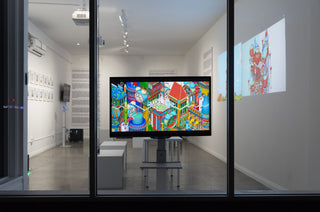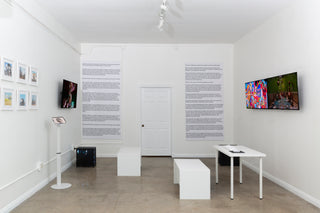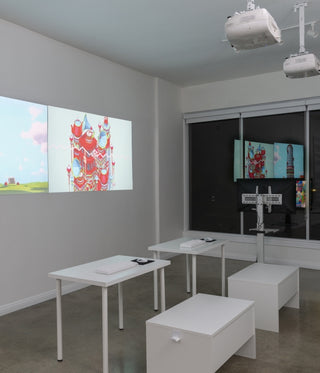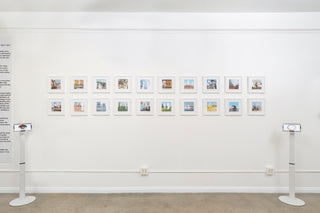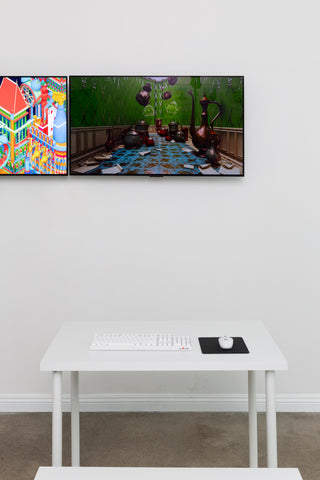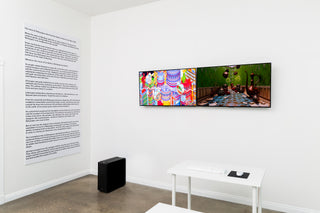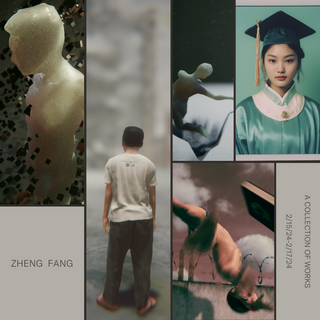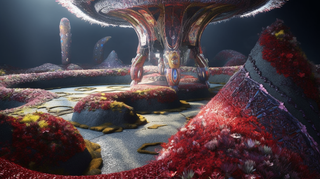-
Killscreen is pleased to announce The Concentric Fictions of a Generous History, the first Los Angeles solo exhibition for the India-based game design studio Studio Oleomingus and its founder Dhruv Jani. The inaugural exhibition presents a collection of interactive fragments that seek to translate the ouroboric writings of a Gujarati diarist, Mir Umar Hassan, into short tales of memory, loss, and identity.
The works in this collection respond to the current autocratic dispensation in India, which seeks to exclude and include citizens in a way that erases uncomfortable truths and defends unfortunate lies. Each story grieves the destructions of places of entangled heritage, examining lynchings and the arrests of dissenting voices while further confronting the religious and doctrinal violence perpetuated on fragile bodies and communities.
The games in the exhibition become a study of communal truths and fears, exploring the discomfort between the definitions of a state and the desires of an individual. Here, interactive fiction becomes a vector of irreverent social and political discourse, borrowing from Indian traditions of street theater and vagabond performances.
The exhibition attempts to create a space for the recollection and reanimation of fissured tales, celebrating the fractured records of subaltern history and confronting the political legacy of appropriation and power. Studio Oleomingus believes that confronting history is knowing that our ability to remember is polluted, and that any single account is always a vacuous record. It is the concentric fictions of our lives that make all history bearable.
The Concentric Fictions of a Generous History was on view at Killscreen from March 15th through March 30th, 2023.
WORKS ON DISPLAY
The Indifferent Wonder of an Edible Place.
Edible Places is a story about a municipal building eater consuming the last tower in a town called Matsyapur. It is an examination of erasure and a rumination about the violent cost and the profound grief of having to survive at the edge of despotism, when places of entangled heritage are willfully effaced. Originally created in response to a court judgment in the case of the demolition of the Babri Masjid in Ayodhya, the game was reworked to challenge a spate of retaliatory demolitions, of the houses of protestors, by our local state government.
Folds of a Separation
Folds is a short game about rooftops, labyrinths, and confinement.
Written to lament the detention of sixteen Dalit-rights activists, and countless authors, reporters, and lawyers in our country; the game is a modest attempt at finding solace in the promise of companionship while contemplating the violent cost of withdrawing bodies from public spaces and imaginations.
A Museum of Dubious Splendors
A Museum of Dubious Splendors, is a collection of short stories about prosaic objects and spurious histories, each written in the manner of a colonial etiological tale. It is an irreverent examination of worth and possession, of aggrandizement and accumulation, and of the violence of objects and the obfuscation of time. But most of all it is an attempt at
subverting our reverence for the hoard of a colonial archive.In the Pause Between the Ringing
In the Pause between the Ringing is a rumination about completion, about territorial margins and about the haunting of bodies and memories that are translated across borders.
Set during the annexation of Sindh in 1843, and told amidst a tangle of cables and time, it is a ghost story that chronicles the violent history of Telephone mining in India.
The Uncertain Repetitions of Truth
The Uncertain Repetitions of Truth is a collection of short interactive fragments that ponders the nature of exactitude and the profound cost of marking time. It is an odd compilation of stories about people caught in the intimate dance between timekeeping and truth-making. But most of all they are stories of repetitions and hauntings, finger-bones and xeroxes, imprints and doppelgangers, and the countless ghosts who linger between the finite delineations of a clock.
ARTIST'S STATEMENT
I
The Concentric Fictions of a Generous History - is a collection of interactive fragments that try to translate the ouroboric writings of a Gujarati diarist, Mir UmarHassan, into short tales about memory, loss, and identity.
Most of the games in this collection were created in response to the current autocratic dispensation, in our country, excluding and including citizens to curate for itself a republic that is as willing to forget uncomfortable truths as it is to defend unfortunate lies.
These are stories written to grieve the destruction of places of entangled heritage, written to examine lynchings and the arrests of dissenting voices, and written amidst a degree of religious and doctrinal violence perpetrated on fragile bodies and fragile communities, that is scarcely to be imagined.
And these games are an attempt at trying to assert that there has to be a way to recollect our past without the fear that it will irrevocably alter our present. There has to be a way for stories to live and be spoken and heard without the dread of complete loss and ostracisation.
II
The work being shown stems from trying to critically examine the cost of nation-building and the price of delineating finite boundaries or sacrosanct identities. It is a study of communal truths and fears, and the discomfort between the definitions of a state and the desires of an individual.
In trying to use interactive fiction as a vector of irreverent social and political discourse, our practice borrows from traditions of street theatre and vagabond performances, of Nukad Nataks, of Nautankis and Bhavais and Jatra performances and Tamashas, of Dholis and Beherupiyas and countless others who are steeped in ideas of disguise, duplicity, intersectional identities, and role play.
These anti-authoritarian traditions, prevalent in postcolonial writing and practice - are central to our understanding of videogames. A game after all is the apotheosis of becoming someone else. A simulated form of being that makes it evident that all truths and identities are always assemblages, uncomfortably put together ever-changing collages of ideas about who we are allowed to be, or who we once identified as.
Moreover, we are keenly interested in the role of power and authority in the nurture or erasure of such fluid identities. Where the right to author individual histories is deeply contested and some stories, from the margins of caste and gender and identity, will simply not be told, because the violence of their recollection and the absurdity of their form is not accommodated in the method of their telling.
III
And so this exhibition is an attempt at creating a space for the recollection and reanimation of fissured tales. A site where play can become the first language of memory. A celebration of the fractured records of subaltern history and a confrontation of the political legacy of appropriation and power.
For we believe that to confront history is to know that our ability to remember has been polluted. To discover that there is an infection of certitude and a weakening of privilege. Because any single history is always a vacuous record. And it is these concentric fictions of our lives, which make all history bearable.
ABOUT THE ARTIST
Studio Oleomingus is a two-person game and arts studio based in Chala, India.
We practise at the intersection of post-colonial writing, speculative architecture, and interactive-fiction. We are deeply interested in the study of colonial authority and the histories that it occludes and our work explores the possible use of videogames spaces as sites of protest and reparation.
Studio Oleomingus is run by Dhruv Jani and Sushant Chakraborty, with additional from Salil Bhayani, Suparna Chakraborty, and Anant Jani.
Killscreen is pleased to announce The Concentric Fictions of a Generous History, the first Los Angeles solo exhibition for the India-based game design studio Studio Oleomingus and its founder Dhruv Jani. The inaugural exhibition presents a collection of interactive fragments that seek to translate the ouroboric writings of a Gujarati diarist, Mir Umar Hassan, into short tales of memory, loss, and identity.
The works in this collection respond to the current autocratic dispensation in India, which seeks to exclude and include citizens in a way that erases uncomfortable truths and defends unfortunate lies. Each story grieves the destructions of places of entangled heritage, examining lynchings and the arrests of dissenting voices while further confronting the religious and doctrinal violence perpetuated on fragile bodies and communities.
The games in the exhibition become a study of communal truths and fears, exploring the discomfort between the definitions of a state and the desires of an individual. Here, interactive fiction becomes a vector of irreverent social and political discourse, borrowing from Indian traditions of street theater and vagabond performances.
The exhibition attempts to create a space for the recollection and reanimation of fissured tales, celebrating the fractured records of subaltern history and confronting the political legacy of appropriation and power. Studio Oleomingus believes that confronting history is knowing that our ability to remember is polluted, and that any single account is always a vacuous record. It is the concentric fictions of our lives that make all history bearable.
The Concentric Fictions of a Generous History was on view at Killscreen from March 15th through March 30th, 2023.
WORKS ON DISPLAY
The Indifferent Wonder of an Edible Place.
Edible Places is a story about a municipal building eater consuming the last tower in a town called Matsyapur. It is an examination of erasure and a rumination about the violent cost and the profound grief of having to survive at the edge of despotism, when places of entangled heritage are willfully effaced. Originally created in response to a court judgment in the case of the demolition of the Babri Masjid in Ayodhya, the game was reworked to challenge a spate of retaliatory demolitions, of the houses of protestors, by our local state government.
Folds of a Separation
Folds is a short game about rooftops, labyrinths, and confinement.
Written to lament the detention of sixteen Dalit-rights activists, and countless authors, reporters, and lawyers in our country; the game is a modest attempt at finding solace in the promise of companionship while contemplating the violent cost of withdrawing bodies from public spaces and imaginations.
A Museum of Dubious Splendors
A Museum of Dubious Splendors, is a collection of short stories about prosaic objects and spurious histories, each written in the manner of a colonial etiological tale. It is an irreverent examination of worth and possession, of aggrandizement and accumulation, and of the violence of objects and the obfuscation of time. But most of all it is an attempt at
subverting our reverence for the hoard of a colonial archive.
In the Pause Between the Ringing
In the Pause between the Ringing is a rumination about completion, about territorial margins and about the haunting of bodies and memories that are translated across borders.
Set during the annexation of Sindh in 1843, and told amidst a tangle of cables and time, it is a ghost story that chronicles the violent history of Telephone mining in India.
The Uncertain Repetitions of Truth
The Uncertain Repetitions of Truth is a collection of short interactive fragments that ponders the nature of exactitude and the profound cost of marking time. It is an odd compilation of stories about people caught in the intimate dance between timekeeping and truth-making. But most of all they are stories of repetitions and hauntings, finger-bones and xeroxes, imprints and doppelgangers, and the countless ghosts who linger between the finite delineations of a clock.
ARTIST'S STATEMENT
I
The Concentric Fictions of a Generous History - is a collection of interactive fragments that try to translate the ouroboric writings of a Gujarati diarist, Mir UmarHassan, into short tales about memory, loss, and identity.
Most of the games in this collection were created in response to the current autocratic dispensation, in our country, excluding and including citizens to curate for itself a republic that is as willing to forget uncomfortable truths as it is to defend unfortunate lies.
These are stories written to grieve the destruction of places of entangled heritage, written to examine lynchings and the arrests of dissenting voices, and written amidst a degree of religious and doctrinal violence perpetrated on fragile bodies and fragile communities, that is scarcely to be imagined.
And these games are an attempt at trying to assert that there has to be a way to recollect our past without the fear that it will irrevocably alter our present. There has to be a way for stories to live and be spoken and heard without the dread of complete loss and ostracisation.
II
The work being shown stems from trying to critically examine the cost of nation-building and the price of delineating finite boundaries or sacrosanct identities. It is a study of communal truths and fears, and the discomfort between the definitions of a state and the desires of an individual.
In trying to use interactive fiction as a vector of irreverent social and political discourse, our practice borrows from traditions of street theatre and vagabond performances, of Nukad Nataks, of Nautankis and Bhavais and Jatra performances and Tamashas, of Dholis and Beherupiyas and countless others who are steeped in ideas of disguise, duplicity, intersectional identities, and role play.
These anti-authoritarian traditions, prevalent in postcolonial writing and practice - are central to our understanding of videogames. A game after all is the apotheosis of becoming someone else. A simulated form of being that makes it evident that all truths and identities are always assemblages, uncomfortably put together ever-changing collages of ideas about who we are allowed to be, or who we once identified as.
Moreover, we are keenly interested in the role of power and authority in the nurture or erasure of such fluid identities. Where the right to author individual histories is deeply contested and some stories, from the margins of caste and gender and identity, will simply not be told, because the violence of their recollection and the absurdity of their form is not accommodated in the method of their telling.
III
And so this exhibition is an attempt at creating a space for the recollection and reanimation of fissured tales. A site where play can become the first language of memory. A celebration of the fractured records of subaltern history and a confrontation of the political legacy of appropriation and power.
For we believe that to confront history is to know that our ability to remember has been polluted. To discover that there is an infection of certitude and a weakening of privilege. Because any single history is always a vacuous record. And it is these concentric fictions of our lives, which make all history bearable.
ABOUT THE ARTIST
Studio Oleomingus is a two-person game and arts studio based in Chala, India.
We practise at the intersection of post-colonial writing, speculative architecture, and interactive-fiction. We are deeply interested in the study of colonial authority and the histories that it occludes and our work explores the possible use of videogames spaces as sites of protest and reparation.
Studio Oleomingus is run by Dhruv Jani and Sushant Chakraborty, with additional from Salil Bhayani, Suparna Chakraborty, and Anant Jani.


